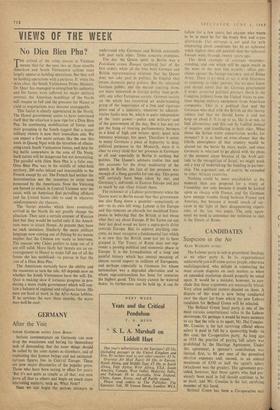SARAH GAINIIAM writes from Bonn:
Serious commentators on Germany can now drop the wearisome and boring (to themselves) task of demanding that the same things should be called by the same names as elsewhere, and of explaining that human beings and not animated- cartoon figures live in Central Europe. These are now major discoveries of the popular press. Those who have been saying in effect for years, 'But it's not quite as simple as all that,' can now leave all that to others and begin on much more interesting matters; such as, What Next?
Next we can begin the serious attempts to understand why Germans and British constantly talk past each other. Three concrete examples.
The day the Queen spent in Berlin was a Politikum erste,' Ranges (political fact of the first order), while all the time both German and British representatives reiterate that the Queen does not take part in politics. In English that means domestic party politics. But the educated German public, and the masses copying them. are more interested in foreign policy than prob- ably any other European society. German society on the whole has recovered an understanding grasp of the importance of a free and vigorous press and of a judiciary. whatever its adminis- trative faults may be, which is quite independent of the 'state power'--police and military--and of the government of the day. But it has not yet got the hang of treating parliamentary business as a kind of high and serious sport; sport with immense winnings, but sport. Therefore it seems to many Germans a piece of hypocrisy to deny political purposes to the Monarch, since it is clear to every child that her presence in Germany at all and especially in Berlin is nothing but politics. The Queen's advisers realise this and this accounts for the drear mediocrity of the speech in Berlin; the fact of her presence was enough of a flung gauntlet for one day. This point will certainly have been taken by our, and Germany's, unfriends in Eastern Europe and just as much by our silent friends there.
The existence of a Labour government when the Queen went to Berlin means that that government has also flung down a gauntlet—consciously or not--to its own left wing. Labour is for Europe and this removes an obstacle for mainland Euro- peans in believing that the British at last mean what they say about Europe. If the Tories cut out their last dead wood we have a supra-party drive towards Europe. But, to achieve anything con- crete, we must recognise a fundamental fact which is so new that the British seem not yet to have grasped it. The Treaty of Rome does not rep- resent a passing political and economic phase in Europe. It is the formalisation of a long and painful history which has central meaning of almost sacred import to millions of Europeans, and perhaps especially to Germans for whom nationalism was a degraded aberration and to whom supranationalism has been for centuries the highest good. This treaty cannot be watered down; its furtherance can be held up, it can lie fallow for a few years, but anyone who wants to be in must be for the treaty first and argue afterwards. Our entrance is not paid for with chuntering about conditions but by an upheaval much slighter (but still painful) than the upheaval Europe went through twenty }ears ago.
The third example of constant misunder- standing, and one which will be again much in the news in the next few months : offset pur- chases against the foreign currency cost of Rhine Army. There is no need to say it with bitterness or contempt to either partner, but we must know and should admit that the German government is under powerful political pressure (born in the Congress lobbies) from the United States to con- tinue buying military equipment from American companies. This is a political fact and the Germans who deal with the British on this thorny subject feel that we should know it and not keep on about it. It is up to us, like it or not, to find alternatives and this can be fruitful instead of negative and humiliating to both sides. What about the Syrian water conservation works, for instance? It is at least an even chance that the febrile atmosphere of that country would be altered for the better by more water, and since Germany is reluctant to go ahead with the plans at the moment alone because of the Arab atti- tude to the recognition of Israel. we might work out a way of undertaking the building in partner- ship. The argument can, of course, be extended to other African countries.
Nothing could be more uncalled-for at the moment than any proposal for a treaty of friendship: not only because it would be looked upon as rivalry with France, and the Germans have enough trouble living between France and America, but because it would smack of sar- casm in the light of their disappointing experi- ence of the last two years. The.. only agree- ment we need to announce our intention to sign is the Treaty of Rome.


































 Previous page
Previous page